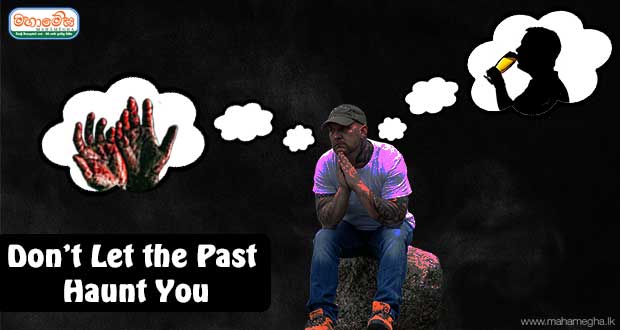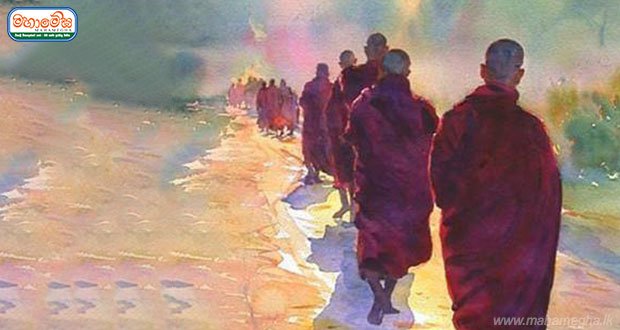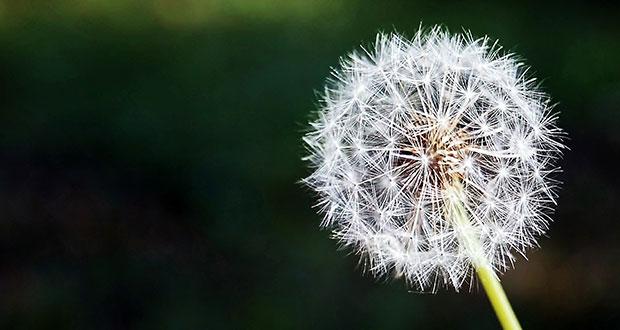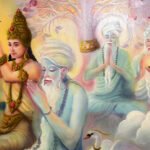There may be many deeds that one repents when thinking of their past. This repentance is unwise consideration (ayonisomanasikāra), the breeding ground for unwholesomeness. Repenting over one’s faults simply multiplies the results of that bad kamma. But if one understands one’s faults, honestly accepts them as faults, and corrects oneself so as not to repeat the same mistakes in the future; such is considered development in the Buddha’s teaching.
Though one’s unwholesome deeds may have already created much bad kamma, still, if one practices Dhamma, one can surpass kamma, because Dhamma is much more powerful. Accordingly, the Buddha taught the correct way for a disciple to wisely reflect on their previous unwholesome actions thus:
“The Buddha in a variety of ways criticizes and censures [unwholesome actions], and says, ‘Abstain from [unwholesome actions]’ Yet, there are [unwholesome actions that I have done] to a greater or lesser extent. That was not right. That was not good. But if I become regretful of my evil act, that evil deed of mine will not be undone.’ So reflecting wisely thus, he stops [performing unwholesome actions], and makes the determination to not [perform them] in the future. Such thinking pattern leads to the eradication of the previously done evil and transcends the accumulated bad karma.”
SN 42.8 Saṅkhadhama sutta
The story of Tambadāṭhika illustrates how one man in the time of the Buddha overcame remorse. Once, there was a band of 499 thieves in Rājagaha. An ugly-looking man with copper teeth called Tambadāṭhika joined them and started robbing people. One day, the people of Rājagaha caught this band of thieves with the help of the army, and they were to be beheaded as punishment. As there wasn’t a public executioner, jailers asked each thief to kill the rest of the thieves and gain himself the chance to live. All the thieves, from the leader to the 499th thief refused. However, Tambadāṭhika, who had come along with the other thieves, agreed to kill others to save himself.
From then on, Tambadāṭhika became the public executioner. He did his job for 55 years and killed more than a thousand thieves and prisoners. When he eventually became weak due to old age, he retired. When working as an executioner, he never had the chance to wear fine clothing, eat delicious food, or wear garlands. Thus, on the day he retired, having gone to the river and bathed, he dressed himself in fine clothing, wore a jasmine garland, and made himself some porridge.
At the same moment, Venerable Arahant Sāriputta, who was awakening from deep concentration wisely considered, looking at the world with his divine eye: “Whom shall I help today? Where should I go for alms?” and seeing Tambadāṭhika, thought: “This person who has collected so much demerit is destined to be born in hell after death. But his fate will change if I help him to make merit.” Thinking thus, Venerable Sāriputta went on alms-round to Tambadāṭhika’s house.
Seeing Venerable Sāriputta, Tambadāṭhika thought: “I haven’t collected any merit throughout my whole life. Instead, I’ve killed many people. Today I have a chance to offer porridge to Venerable Sāriputta and reap a great harvest of merit.”
Tambadāṭhika then invited the Venerable Sāriputta to his house, offered a seat, and offered porridge to his alms-bowl. While Venerable Sāriputta was taking his alms, he asked Tambadāṭhika to take his own breakfast. Tambadāṭhika, who desired to have a delicious breakfast after a long time, satisfied his hunger before returning to Venerable Sāriputta and sitting down near his feet.
When Venerable Sāriputta began to explain the Dhamma, Tambadāṭhika became confused and distressed. Venerable Sāriputta asked, “Why upāsaka, why are you so confused?”
“Oh, Venerable Sir, I’ve done many evil deeds throughout my life. I’ve killed many people as an executioner. Venerable Sir, these hands … these hands were always stained with blood. The past is haunting my mind. I can’t focus my mind on the Dhamma.”
Venerable Sāriputta, who understood the rarity of human birth, felt compassionate towards Tambadāṭhika and thought of a way to arouse the wholesome within him, saying:
“Why, Tambadāṭhika, did you kill those people purposefully, on your own accord? Or were you following the King’s orders and doing your duty?”
“Oh, Venerable Sir, I did not want to kill any of them. I had to do it obeying the royal order.”
“Then Tambadāṭhika, forget it. Don’t keep on thinking about it; you were just performing your duty. Let it go. Now listen to this Dhamma.”
Hearing Venerable Sāriputta’s words, Tambadāṭhika became elated, thinking: “Oh, it’s strange how Venerable Sāriputta looks at me with compassion. Everyone else perceives me as a devil. But his compassion and forgiveness are unbelievable. I shall forget everything and listen to this Supreme Dhamma which is embodied in this monk, producing such a beautiful, gentle mind.”
“Venerable Sir, yes, I will forget everything. Your compassion quenched me as a fire is extinguished. Oh, Venerable Sir, please teach me the Dhamma,” pleaded Tambadāṭhika.
Venerable Sāriputta then taught him the danger of samsaric existence, how beings are born according to their kamma, and finally the Four Noble Truths. Tambadāṭhika, who drank deep the spirit of these words, became a faithful follower, a Saddhānusārī disciple, and entered the path of the Stream-enterer. Tambadāṭhika wholeheartedly took the three refuges and observed the five precepts.
Tambadāṭhika became thrilled. Dhamma changed his whole life. Having learned the Dhamma from Venerable Sāriputta, he looked at his life from a different point of view, and was able to see the reality of life.
When Venerable Sāriputta was leaving his house, Tambadāṭhika followed for some distance, stopped and continued looking on in veneration until Venerable Sāriputta was out of sight. At that moment, Tambadāṭhika was suddenly gored to death by a cow possessed by a she-devil. And after death, he was reborn in the Tusita Heaven.
After this incident, monks in the Jetavana monastery discussed Tambadāṭhika’s fate: “Venerable Ones, do you know the executioner Tambadāṭhika, who killed thousands of people for over 55 years, retired today, gave his first alms-giving today, and unfortunately died this evening. Where could he have been reborn?”
The Supreme Buddha then explained that he was reborn in the Tusita heaven. It surprised the monks how Tambadāṭhika’s life had changed so suddenly, through a short Dhamma discourse.
On that occasion, the Supreme Buddha uttered this verse:
Sahassampi ce vācā,
anatthapadasaṃhitā;
Ekaṃ atthapadaṃ seyyo,
yaṃ sutvā upasammati.
Better than a thousand useless words
is one useful word,
hearing which one attains peace.
Dhammapada 100
In this way, words have the power to change the world. Words can hurt one, words can betray one; words can console one, or confuse one; open the doors to heaven, or push one through the doors to the four hells; help one collect merits, or facilitate gaining demerit.
Thereby, words that we speak can either harm or help ourselves and others. The best-spoken words of the world are collected in the Supreme Buddha’s Dhamma.
So, meritorious friends, if there are any memories you try hard to forget, which still produce remorse inside, making you regret, remember: you cannot change the past. You cannot re-correct the past. But you can change your life at present. Let go of all faults. Correct yourself. Make a strong determination not to repeat your past mistakes, and continue to develop wholesome qualities.
Go for refuge in the Noble Triple Gem wholeheartedly. Observe and protect the precepts as you would your own life. Thereafter, you may consider yourself as a newly born person. Now, it’s a new life. Start it from the beginning. Change your world, by changing your path. Fill your life with merits. Avoid unwholesome deeds. Practice the Supreme Dhamma. Practice giving without a limit. Give what you like the most. Spread boundless loving-kindness to all beings in all directions. Recollect the endless qualities of our Great Teacher Lord Buddha who eradicated remorse forever. Contemplate the impermanence of life and develop insightful wisdom.
And at the end of each day, look back on your new life and fill your mind with happiness over the merits you’ve collected. Those merits and that pure happiness will open the doors of heaven to you. Again, it was declared by the Supreme Buddha that:
Ye keci buddhaṃ saraṇaṃ gatāse,
na te gamissanti apāyabhūmiṃ;
pahāya mānusaṃ dehaṃ,
devakāyaṃ paripūressantī’ti.
Those who have gone to the Buddha for refuge
Will not go to the plane of misery.
On discarding the human body,
They will fill the hosts of devas.
SN 1.37 Samaya Sutta
Therefore, friends, make the Dhamma your refuge for overcoming the previous kamma and rejoice here and hereafter. May this sublime Dhamma help all of us to realize the Four Noble Truths in this Gotama Buddha’s Dispensation.
-Mahamevnawa Anagarika Monastery-












Recent Comments